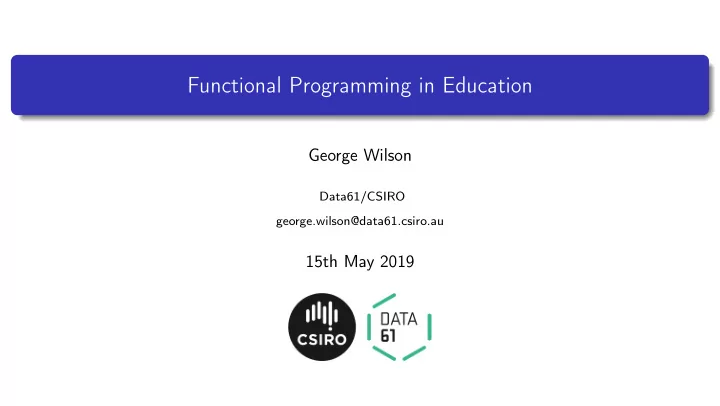

Functional Programming in Education George Wilson Data61/CSIRO george.wilson@data61.csiro.au 15th May 2019
University First year, first semester
Which language?
class Hello { public static void main(String[] args) { System.out.println("Hello, world!"); } }
Content Week 1 Basic expressions Week 2 procedure declarations Week 3 if-statement Week 4 while-statement Week 5 for-statement . . .
( define (factorial n) ( if (<= n 1) 1 (* n (factorial (- n 1)))))
Evaluation by substitution ( define (sum-of-squares x y) (+ (sqr x) (sqr y)))
Evaluation by substitution ( define (sum-of-squares x y) (+ (sqr x) (sqr y))) (sum-of-squares 3 4)
Evaluation by substitution ( define (sum-of-squares x y) (+ (sqr x) (sqr y))) (sum-of-squares 3 4) => (+ (sqr 3) (sqr 4))
Evaluation by substitution ( define (sum-of-squares x y) (+ (sqr x) (sqr y))) (sum-of-squares 3 4) => (+ (sqr 3) (sqr 4)) => (+ (* 3 3) (sqr 4))
Evaluation by substitution ( define (sum-of-squares x y) (+ (sqr x) (sqr y))) (sum-of-squares 3 4) => (+ (sqr 3) (sqr 4)) => (+ (* 3 3) (sqr 4)) => (+ 9 (sqr 4))
Evaluation by substitution ( define (sum-of-squares x y) (+ (sqr x) (sqr y))) (sum-of-squares 3 4) => (+ (sqr 3) (sqr 4)) => (+ (* 3 3) (sqr 4)) => (+ 9 (sqr 4)) => (+ 9 (* 4 4))
Evaluation by substitution ( define (sum-of-squares x y) (+ (sqr x) (sqr y))) (sum-of-squares 3 4) => (+ (sqr 3) (sqr 4)) => (+ (* 3 3) (sqr 4)) => (+ 9 (sqr 4)) => (+ 9 (* 4 4)) => (+ 9 16)
Evaluation by substitution ( define (sum-of-squares x y) (+ (sqr x) (sqr y))) (sum-of-squares 3 4) => (+ (sqr 3) (sqr 4)) => (+ (* 3 3) (sqr 4)) => (+ 9 (sqr 4)) => (+ 9 (* 4 4)) => (+ 9 16) => 25
Incredible breadth of content complexity analysis symbolic computation with quotation interpreters object-oriented programming logic programming many other concepts
(or similar)
data List a = Nil | Cons a ( List a)
( define (sum items) ( cond ((null? items) 0) ( else (+ (car items) (sum (cdr items))))))
( define (sum items) ( cond ((null? items) 0) ( else (+ (car items) (sum (cdr items)))))) sum items = case items of Nil -> 0 Cons x xs -> x + sum xs
( define (new-if predicate then-clause else-clause) ( cond (predicate then-clause) ( else else-clause)))
( define (new-if predicate then-clause else-clause) ( cond (predicate then-clause) ( else else-clause))) newIf True t f = t newIf False t f = f
Criticisms Examples are drawn from overly-technical domains ( define (deriv exp var) ( cond ((number? exp) 0) ((variable? exp) ( if (same-variable? exp var) 1 0)) ((sum? exp) (make-sum (deriv (addend exp) var) (deriv (augend exp) var))) ((product? exp) (make-sum (make-product (multiplier exp) (deriv (multiplicand exp) var)) (make-product (deriv (multiplier exp) var) (multiplicand exp)))) (else (error "unknown expression type -- DERIV" exp))))
Criticisms Lacking coverage of foundational problem-solving techniques From an educational point of view, our experience suggests that undergraduate computer science courses should emphasize basic notions of modularity, specification, and data abstraction , and should not let these be displaced by more advanced topics, such as design patterns, object-oriented methods, concurrency, functional languages, and so on. — Jackson and Chapin, 2000 (emphasis mine)
HTDP Wadler '87 SICP
??? HTDP Wadler '87 SICP
3 + False <interactive>:1:1: error: • No instance for (Num Bool) arising from a use of ‘+’ • In the expression: 3 + False In an equation for ‘it’: it = 3 + False
GHC custom type errors {-# language DataKinds, TypeFamilies, TypeOperators #-} {-# language UndecidableInstances #-} import GHC.TypeLits instance TypeError ( Text "Booleans are not numbers" :$$: Text "so we cannot add or multiply them") => Num Bool where
3 + False <interactive>:1:1: error: • Booleans are not numbers so we cannot add or multiply them • In the expression: 3 + False In an equation for ‘it’: it = 3 + False
Custom preludes for a staged introduction Prelude.hs module Prelude ( Integer , (+) ) where import GHC.Num ( Integer ) import qualified GHC.Num as N (+) :: Integer -> Integer -> Integer (+) = ( N .+)
A brief personal anecdote. . .
Thanks for listening!
References • Structure and Interpretation of Computer Programs Harold Abelson and Gerald Jay Sussman with Julie Sussman • A Critique of Abelson and Sussman Philip Wadler • The Structure and Interpretation of the Computer Science Curriculum Matthias Felleisen, Robert Bruce Findler, Matthew Flatt, Shriram Krishnamurthi • How to Design Programs Matthias Felleisen, Robert Bruce Findler, Matthew Flatt, Shriram Krishnamurthi • The Risks and Benefits of Teaching Purely Functional Programming in First Year Manuel Chakravarty and Gabriele Keller
Recommend
More recommend